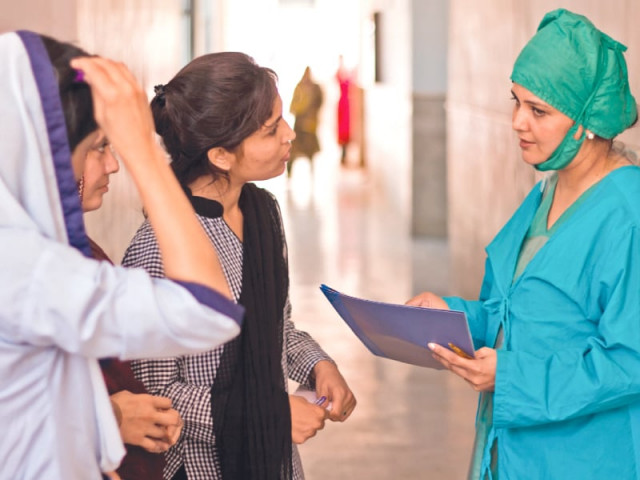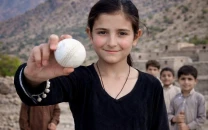International day to end obstetric fistula: ‘Help me stay dry’
Every year, Pakistan has 4,500—5,000 new cases of fistula. Out of these, only 500—600 reach doctors for treatment.

Dr Saboohi Mehdi is one of Pakistan’s few surgeons trained to repair fistulas. Even fewer surgeons work in this field. PHOTO: FAISAL SAYANI / EXPRESS
She wept inconsolably, and the doctors at Koohi Goth Hospital Karachi could not understand why. They had treated this young woman in her 20s already, and they were ready to discharge her so that she could go back to her family near Pakistan’s border with Afghanistan.
A translator was brought in who told them the real problem. “My first born is with the money-lenders as girwi (mortgage). I developed the fistula during his birth. But I was so desperate to be healed of this constant leaking that I took the chance. I needed money to reach here to get treatment.” Doctors at the hospital raised the money and sent her home. One life saved out of the nearly 5,000 women that develop the fistula every year in Pakistan. But thousands await treatment.
For fistulas, precaution is the best cure. And the cure is simple: Women of Pakistan need to deliver babies into trained hands and with basic health care facilities. This cure is still a distant dream.
Snuggled away in the outskirts of busy Karachi, Koohi Goth Hospital is Pakistan’s only hospital exclusively built to end the scourge of this preventable disease. Only, there should be not even one fistula hospital in Pakistan, because fistulas should no longer exist. “The last fistula case in England was in the 1920s. Here we are with 5,000 new cases every year,” says Dr Shershah Syed, founder of this hospital.
“If the labour is prolonged, the baby’s head can get stuck in the birth canal. If it keeps pushing against the thin wall between the bladder or rectum and the wall of the birth canal, thereby causing strain,” says Dr Suboohi Mehdi, one of the surgeons at Koohi Goth Hospital.
Another way a fistula may be formed is if, by mistake of an unskilled surgeon, a cut is caused in the bladder or rectum during surgery. “We are able to treat just 500—600 every year. Lack of awareness and no accessibility to treatment facilities is the reason,” says Dr Sajjad Ahmed, project manager Fistula Project. The project, run by Pakistan National Forum on Women’s Health (PNFWH) and UNFPA, has treated some 3,400 women since it started off in 2006.
Women suffering from fistulas leak urine or stool uncontrollably. Because of this, they are socially ostracised and lead isolated lives. The fear of leaking leads to them starving themselves, which in turn leads to malnourishment-related problems. They miss basic joys like socializing and traveling by public transport.
“I have forgotten what a normal life is. All I have done the last four lives is wash clothes,” says 40-year-old Rihana from interior Sindh. Rihana cries easily; she knows her case is a complicated one. “I don’t know how I will fix her. Sometimes, the cases are so messed up by the time they come to us that there is little we can do,” says Dr Mehdi.
“The first thing we do when a lot of them reach here is give them a shower,” says the dedicated Noor Gul, a senior nurse at the hospital. Gul is now a trainer, helping train young girls who come to the Koohi Goth Midwifery School and Hostel. Once trained, these girls will go back to their communities and be able to help deliver babies safely, so that more women do not develop this disease.
In a message on this day, the President Society of Obstetricians and Gynecologists of Pakistan (SOGP), Dr Tasneem Ashraf correctly points out that doctors must identify high risk patients for fistula development, especially pregnant women below the age of 20 years or above the age of 40 years, women who have given birth to many children, those suffering from obesity or Anemia, or having larger than normal babies.
Husbands on Board
Naz Bibi is tiny in stature but gives a resolute smile. Suffering from a fistula since the last nine years, this woman in her 40s has come to Karachi all the way from Goth Dera Bugti. She lies on a plastic sheet spread out under her, and can’t wait for the day when she will be dry once more. “Every one left me. Family, friends. I smelled all the time. I leaked non-stop. Yet, my husband was the only one in my life. He brought me here,” she says.
“We are seeing a definite positive change in the trend. More and more husbands now support their wives through the ordeal,” says Dr Ahmed.
“My husband brought me here all the way from Sialkot,” says Fozia, who developed a fistula during the birth of her first child. “I am so excited! Once I heal, I will be able to say my namaz. I have not been able to pray for the last seven years”.
Facts in numbers
Fistula is a poor women’s disease, and the patients are 99 per cent poor women who cannot afford to get their child delivered under proper medical care.
Every year, Pakistan has 4,500—5,000 new cases of fistula. Out of these, only 500—600 reach doctors for treatment.
Pakistan has an estimated 38 surgeons who can perform fistula repair surgeries, but because this is not a lucrative line of medicine, only an estimated 15 are regularly working in this field.
Life saving info:
For information, call 0800-76200
Pakistan National Forum on Women Health
PMA House, Sir Aga Khan III Road, Karachi.
Office number: 021-32231534
Karachi:
Dr Sher Shah Syed
Koohi Goth Hospital
0315-8230856
0333-3026437
Islamabad:
Maternal and Child Care Centre (Professor Dr Ghazala Mehmood, Dr Kausar Tasneem Bangash)
Pakistan Institute of Medical Sciences (PIMS)
Phone: 051-9260450 Mobile: 0300-5510525
Lahore:
Professor Yasmeen Rashid, Dr Tayyaba Majeed
Gynecology ward, Lady Willingdon Hospital
Mobile: 0300-9487305
Multan:
Dr Rafeeq Anjum
Urology Ward
Mobile: 0300-6303574
Peshawar:
Professor Nasreen Ruby and Dr Tanveer Shafqat
Gynecology ward, Lady Reading Hospital
Phone: 091-5810779 Mobile: 0300-6303574
Quetta:
Dr Sadrak Jalal
Christian Hospital, Mission Road.
Mobile: 0300-8381724
Professor Saadat Khan, Dr Haq Nawaz, Dr Masha Khan
Sandeman Civil Hospital.
Mobile: 0321-8198024
Larkana:
Professor Rafi Baloch, Dr Shaista Abro
Gynecology ward, Shaikh Zayed Women Hospital
Chandka Medical College
Mobile: 0300-3415322
Fistula relief centres
Karachi:
Professor Dr Nargis Soomro, Civil Hospital
Dr Azra Jameel, Sindh Government Qatar Hospital
Orangi Town, Karachi.
Hyderabad:
Professor Dr Pushpa Sri Chand
Isra University Hospital
Dr Nabeela Hassan
Liaquat University of Medical Health Sciences
Abbottabad:
Dr Rahat Ansa
Benazir Bhutto Shaheed Women and Children Health Centre
Nawabshah:
Dr Razia Bahadur
Peoples Medical College, Civil Hospital
0345-2750470; 0300-2162392
A slideshow on the Koohi Goth Hospital can be viewed here.
Published in The Express Tribune, May 24th, 2014.



















COMMENTS
Comments are moderated and generally will be posted if they are on-topic and not abusive.
For more information, please see our Comments FAQ